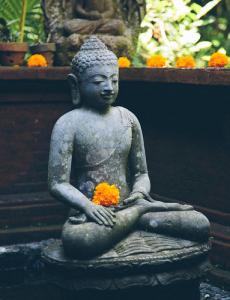Admittedly, the title of this piece is a little hyperbolic, but hear me out. Deep polarization is the driving force in today’s politics and its accompanying cultural debates. And that’s not just confined to the United States. According to Pew Research, we’re seeing deep political divides in the Netherlands, Canada, the United Kingdom, Germany, Singapore, Spain, France, Sweden and Belgium. In addition, Pew found that many traditionally democratic countries are growing deeply dissatisfied with their governments, and large democracies like India (the world’s largest) are systematically removing basic freedoms from their people.
The philosophical and spiritual teachings of Siddhartha Gautama, the Buddha, has long been a beacon of wisdom and serenity in a tumultuous world. As global societies grapple with the increasing polarization within politics and social issues, Buddhism’s central tenet of the Middle Way offers a timely remedy to the world’s growing divisions.

Majjhima Patipada, or the Middle Way, is fundamental to Buddhist thought. It advocates for a balanced approach to life, eschewing extremes of self-indulgence and promoting moderation as a virtue. Buddha’s teachings guide us towards a path of balance, advocating for a middle ground. To avoid unnecessary suffering in our pursuit of goals, it’s essential not to veer towards extremes. This means, for example, engaging in enjoyment in moderation and refraining from overly harsh physical deprivation.
The Buddha identified himself as a vibhajyavādin, someone who adopts a conditional stance on propositions, as opposed to an ekāntavādin who holds an unwavering, absolute viewpoint. The vibhajyavādin can then extend this philosophy to social and political issues as well. In a world rife with environmental degradation, human rights abuses and oppressive governments, the Middle Way encourages a path that neither ignores these problems nor approaches them with counterproductive zeal. Apathy won’t solve any problems and too often protests inadvertently match the anger and hatred in which they are protesting. The Middle Way, on the other hand, promotes compassionate action that is grounded in realistic assessments of situations, advocating for solutions that benefit the greatest number without causing harm.

Moreover, Buddhism’s concept of Pratītyasamutpāda, or dependent origination, underscores the interconnectedness of all things. This understanding fosters a sense of responsibility towards others and the environment, encouraging actions that support the well-being of all beings. The Middle Way makes Pratītyasamutpāda psychologically, morally and practically possible to implement.
Implementing Pratītyasamutpāda then leads to the Buddhist concept and teaching of compassion and loving-kindness. Metta (loving-kindness) meditation as a spiritual practice cultivates an attitude of benevolence and goodwill towards all interconnected beings. This practice softens the hardened positions that often characterize political and social discourse, opening the way for more constructive interactions. There is no reason anyone should have to die on their metaphorical hill.

Increasing one’s practice of loving-kindness and mindfulness, another key aspect of Buddhism, fosters a heightened awareness of one’s thoughts, emotions, and surroundings. In a polarized world, such awareness is vital and can lead to greater empathy and understanding, reducing conflict and promoting cooperative problem-solving.
As the world becomes increasingly polarized and the pendulum of our political discourse continues to swing between extremes, Buddhism’s teachings on the Middle Way, compassion, loving-kindness and interdependence offers a pathway for those seeking compromise and ultimately peace. Buddhism provides tools for navigating and resolving these complex issues of our time, reminding us that ancient wisdom can indeed offer solutions for modern problems.













